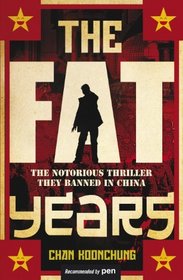I really wanted to like this, but ultimately I just found it boring and frustrating. It's set in China in the near future, after the financial decline of the West. In the book, after the market crash a few years ago, there was a brief little period of recovery (where we are right now), followed by another decline. China managed to survive this and, in fact, ushered in an era of political and social stability and unprecedented financial strength. Everyone is walking around in a mild state of euphoria and convinced they live in the best time in the best country ever. Everyone except for a few scattered people, who remember a whole month of wide spread unrest, violence, and government crackdowns between the second western financial crash and China's declaration of a new age of ascendency. No one else remembers this month, or are even concerned about it when those who do bring the subject up. A small group of those who do remember are determined to figure out what's going on.
This is an excellent premise. Unfortunately, the book really doesn't deliver on this sort of mystery/investigative adventure promise. Instead, two thirds of the book follow several disparate characters wondering around, explaining their extensive backstories, falling into each other's orbits, and then wandering off again. There are, in fact, several long digressions following the backstories and future plans of minor characters who have no impact on the plot, the main characters, and are never seen again once their scene is over. Really annoying. During these first two thirds of the book, there is no real investigation of this big mystery of the missing month and the people's weird complacency. No forward movement, no clues, nothing. Then the entire last third of the book consists of a MASSIVE expositional infodump where one character sits in a chair and lectures the other characters about how China engineered their new golden age. There is nearly 100 pages of one character sitting there laying out the academic theories behind China's new economic and political policies. There is no dramatic tension whatsoever.
I think part of the problem is that the book I thought I was reading is apparently not the book that Koonchung wrote. Given the blurb on the book itself and the io9 article where I first heard about this book a while back, I thought I was reading a mystery about a missing month and a weirdly complacent populace in a near-future fake utopia. However, according to the translator's notes at the end of the novel, I was actually reading a scathing indictment of current Chinese culture, where the fake cheerfulness represents the current citizens' complacency and the sweeping changes instituted in the wake of the West's financial collapse mirror a lot of the political pushes China wants to put in place right now.
Maybe it's because I don't know enough about current Chinese culture/politics to see it, or maybe it's because for a metaphor to work as a metaphor in narrative fiction it first has to work as, you know, a narrative and it just doesn't in this book. I don't know. But I just didn't care much for this book, in the end.
This is an excellent premise. Unfortunately, the book really doesn't deliver on this sort of mystery/investigative adventure promise. Instead, two thirds of the book follow several disparate characters wondering around, explaining their extensive backstories, falling into each other's orbits, and then wandering off again. There are, in fact, several long digressions following the backstories and future plans of minor characters who have no impact on the plot, the main characters, and are never seen again once their scene is over. Really annoying. During these first two thirds of the book, there is no real investigation of this big mystery of the missing month and the people's weird complacency. No forward movement, no clues, nothing. Then the entire last third of the book consists of a MASSIVE expositional infodump where one character sits in a chair and lectures the other characters about how China engineered their new golden age. There is nearly 100 pages of one character sitting there laying out the academic theories behind China's new economic and political policies. There is no dramatic tension whatsoever.
I think part of the problem is that the book I thought I was reading is apparently not the book that Koonchung wrote. Given the blurb on the book itself and the io9 article where I first heard about this book a while back, I thought I was reading a mystery about a missing month and a weirdly complacent populace in a near-future fake utopia. However, according to the translator's notes at the end of the novel, I was actually reading a scathing indictment of current Chinese culture, where the fake cheerfulness represents the current citizens' complacency and the sweeping changes instituted in the wake of the West's financial collapse mirror a lot of the political pushes China wants to put in place right now.
Maybe it's because I don't know enough about current Chinese culture/politics to see it, or maybe it's because for a metaphor to work as a metaphor in narrative fiction it first has to work as, you know, a narrative and it just doesn't in this book. I don't know. But I just didn't care much for this book, in the end.




